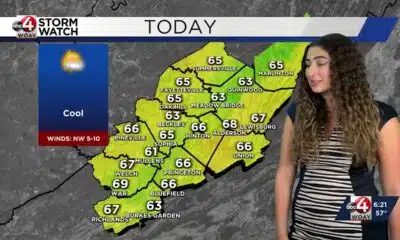News from the South - West Virginia News Feed
‘Expensive and complicated’: Most rural hospitals no longer deliver babies
by Anna Claire Vollers, West Virginia Watch
June 13, 2025
Nine months after Monroe County Hospital in rural South Alabama closed its labor and delivery department in October 2023, Grove Hill Memorial Hospital in neighboring Clarke County also stopped delivering babies.
Both hospitals are located in an agricultural swath of the state that’s home to most of its poorest counties. Many residents of the region don’t even have a nearby emergency department.
Stacey Gilchrist is a nurse and administrator who’s spent her 40-year career in Thomasville, a small town about 20 minutes north of Grove Hill. Thomasville’s hospital shut down entirely last September over financial difficulties. Thomasville Regional hadn’t had a labor and delivery unit for years, but women in labor still showed up at its ER when they knew they wouldn’t make it to the nearest delivering hospital.
“We had several close calls where people could not make it even to Grove Hill when they were delivering there,” Gilchrist told Stateline shortly after the Thomasville hospital closed. She recalled how Thomasville nurses worked to save the lives of a mother and baby who’d delivered early in their ER, as staff waited for neonatal specialists to arrive by ambulance from a distant delivering hospital.
“It would give you chills to see what all they had to do. They had to get inventive,” she said, but the mother and baby survived.
Now many families must drive more than an hour to reach the nearest birthing hospital.
Nationwide, most rural hospitals no longer offer obstetric services. Since the end of 2020, more than 100 rural hospitals have stopped delivering babies, according to a new report from the Center for Healthcare Quality & Payment Reform, a national policy center focused on solving health care issues through overhauling insurance payments. Fewer than 1,000 rural hospitals nationwide still have labor and delivery services.
Across the nation, two rural labor and delivery departments shut their doors every month on average, said Harold Miller, the center’s president and CEO.
“It’s the perfect storm,” Miller told Stateline. “The number of births are going down, everything is more expensive in rural areas, health insurance plans don’t cover the cost of births, and hospitals don’t have the resources to offset those losses because they’re losing money on other services, too.”
Staffing shortages, low Medicaid reimbursement payments and declining birth rates have contributed to the closures. Some states have responded by changing how Medicaid funds are spent, by allowing the opening of freestanding birth centers, or by encouraging urban-based obstetricians to open satellite clinics in rural areas.
Yet the losses continue. Thirty-six states have lost at least one rural labor and delivery unit since the end of 2020, according to the report. Sixteen have lost three or more. Indiana has lost 12, accounting for a third of its rural hospital labor and delivery units.
In rural counties the loss of hospital-based obstetric care is associated with increases in births in hospital emergency rooms, studies have found. The share of women without adequate prenatal care also increases in rural counties that lose hospital obstetric services.
And researchers have seen an increase in preterm births — when a baby is born three or more weeks early — following rural labor and delivery closures. Babies born too early have higher rates of death and disability.
Births are expensive
The decline in hospital-based maternity care has been decades in the making.
Traditionally, hospitals lose money on obstetrics. It costs more to maintain a labor and delivery department than a hospital gets paid by insurance to deliver a baby. This is especially true for rural hospitals, which see fewer births and therefore less revenue than urban areas.
“It is expensive and complicated for any hospital to have labor and delivery because it’s a 24/7 service,” said Miller.
A labor and delivery unit must always have certain staff available or on call, including a physician who can perform cesarean sections, nurses with obstetric training, and an anesthetist for C-sections and labor pain management.
You can’t subsidize a losing service when you don’t have profit coming in from other services.
– Harold Miller, president and CEO of the Center for Healthcare Quality & Payment Reform
“There’s a minimum fixed cost you incur [as a hospital] to have all of that, regardless of how many births there are,” Miller said.
In most cases, insurers don’t pay hospitals to maintain that standby capacity; they’re paid per birth. Hospitals cover their losses on obstetrics with revenue they get from more lucrative services.
For a larger urban hospital with thousands of births a year, the fixed costs might be manageable. For smaller rural hospitals, they’re much harder to justify. Some have had to jettison their obstetric services just to keep the doors open.
“You can’t subsidize a losing service when you don’t have profit coming in from other services,” Miller said.
And staffing is a persistent problem.
Harrison County Hospital in Corydon, Indiana, a small town on the border with Kentucky, ended its obstetric services in March after hospital leaders said they were unable to recruit an obstetric provider. It was the only delivering hospital in the county, averaging about 400 births a year.
And most providers don’t want to remain on call 24/7, a particular problem in rural regions that might have just one or two physicians trained in obstetrics. In many rural areas, family physicians with obstetrical training fill the role of both obstetricians and general practitioners.
Ripple effects
Even before Harrison County Hospital suspended its obstetrical services, some patients were already driving more than 30 minutes for care, the Indiana Capital Chronicle reported. The closure means the drive could be 50 minutes to reach a hospital with a labor and delivery department, or to see providers for prenatal visits.
Longer drive times can be risky, resulting in more scheduled inductions and C-sections because families are scared to risk going into labor naturally and then facing a harrowing hourlong drive to the hospital.
Having fewer labor and delivery units could further burden ambulance services already stretched thin in rural areas.
And hospitals often serve as a hub for other maternity-related services that help keep mothers and babies healthy.
“Other things we’ve seen in rural counties that have hospital-based OB care is that you’re more likely to have other supportive things, like maternal mental health support, postpartum groups, lactation support, access to doula care and midwifery services,” said Katy Kozhimannil, a professor at the University of Minnesota School of Public Health, whose research focuses in part on maternal health policy with a focus on rural communities.
State action
Medicaid, the state-federal public insurance for people with low incomes, pays for nearly half of all births in rural areas nationwide. And women who live in rural communities and small towns are more likely to be covered by Medicaid than women in metro areas.
Experts say one way to save rural labor and delivery in many places would be to bump up Medicaid payments.
As congressional Republicans debate President Donald Trump’s tax and spending plan, they’re considering which portions of Medicaid to slash to help pay for the bill’s tax cuts. Maternity services aren’t on the chopping block.
But if Congress reduces federal funding for some portions of Medicaid, states — and hospitals — will have to figure out how to offset that loss. The ripple effects could translate into less money for rural hospitals overall, meaning some may no longer be able to afford labor and delivery services.
“Cuts to Medicaid are going to be felt disproportionately in rural areas where Medicaid makes up a higher proportion of labor and delivery and for services in general,” Kozhimannil said. “It is a hugely important payer at rural hospitals, and for birth in particular.”
And though private insurers often pay more than Medicaid for birth services, Miller believes states shouldn’t let companies off the hook.
“The data shows that in many cases, commercial insurance plans operating in a state are not paying adequately for labor and delivery,” Miller said. “Hospitals will tell you it’s not just Medicaid; it’s also commercial insurance.”
He’d like to see state insurance regulators pressure private insurance to pay more. More than 40% of births in rural communities are covered by private insurance.
Yet there’s no one magic bullet that will fix every rural hospital’s bottom line, Miller said: “For every hospital I’ve talked to, it’s been a different set of circumstances.”
Stateline reporter Anna Claire Vollers can be reached at avollers@stateline.org.
GET THE MORNING HEADLINES.
West Virginia Watch is part of States Newsroom, a nonprofit news network supported by grants and a coalition of donors as a 501c(3) public charity. West Virginia Watch maintains editorial independence. Contact Editor Leann Ray for questions: info@westvirginiawatch.com.
The post ‘Expensive and complicated’: Most rural hospitals no longer deliver babies appeared first on westvirginiawatch.com
Note: The following A.I. based commentary is not part of the original article, reproduced above, but is offered in the hopes that it will promote greater media literacy and critical thinking, by making any potential bias more visible to the reader –Staff Editor.
Political Bias Rating: Center-Left
This content focuses on the struggles faced by rural hospitals in maintaining labor and delivery services, highlighting the impact of healthcare funding, Medicaid reimbursement rates, and staffing shortages. It emphasizes the challenges rural communities face, especially low-income populations dependent on Medicaid, and inspects the consequences of reduced funding while pointing out the role of insurance companies and policymakers. The article leans mildly left by framing Medicaid expansion and insurance reform as necessary solutions and by critiquing cuts to Medicaid that could harm vulnerable rural communities. However, it maintains a fact-based, investigative tone and includes perspectives from various stakeholders without overt ideological language or partisan rhetoric.
News from the South - West Virginia News Feed
Katie's Full Forecast for August 26
SUMMARY: Katie’s full forecast for August 26 predicts cool, crisp mornings with temperatures in the high 40s to low 50s, about 8 to 10 degrees cooler than yesterday. Daytime highs will warm into the low to mid-60s, below the average 80 degrees, offering comfortable and beautiful weather. Light northwest winds are expected with little chance of gusts. Overnight lows remain cool, with river fog likely in some areas. Rain chances are minimal this week, making it ideal for outdoor activities like washing your car. The UV index remains high despite mixed clouds and sun, so sunscreen is recommended. Labor Day weekend promises mild temperatures in the low 70s and mostly dry conditions.
FOLLOW US ON FACEBOOK AND TWITTER:
https://facebook.com/WOAYNewsWatch
https://twitter.com/WOAYNewsWatch
News from the South - West Virginia News Feed
Optum Rx invokes open meetings law to fight Kentucky counties on opioid suits
by Aneri Pattani, KFF Health News, West Virginia Watch
August 25, 2025
UnitedHealth Group’s multibillion-dollar pharmacy benefit manager, Optum Rx, is suing five Kentucky counties in an attempt to force them out of national opioid litigation against the company.
Pharmacy benefit managers, often called PBMs, act as middlemen that negotiate prescription drug prices between drug companies, insurance plans, and pharmacies. Some lawyers and advocates say PBMs helped fuel the overdose crisis by failing to restrict the flow of opioid prescriptions.
As governments begin exploring potential lawsuits against PBMs — a step that could represent the next wave in opioid-related litigation — Optum Rx is attempting to shut down those efforts, in some cases before they even fully take shape.
In June, Optum Rx sued Anderson, Boyd, Christian, Nicholas, and Oldham counties in Kentucky for allegedly making decisions about participating in the new wave of national opioid lawsuits behind closed doors, violating Kentucky’s open meetings law. Optum Rx is asking courts to effectively force those counties to make their decisions again, this time in open meetings, potentially with the hope that some won’t bother because of the administrative burden. The result could be fewer claims against the company and possibly less money for it to pay in a future settlement.
But legal experts call Optum’s case “hypertechnical” and “frivolous,” and addiction recovery advocates say it could set a dangerous precedent for companies to evade accountability for their role in fueling the overdose crisis.
Christine Minhee, an attorney, a national expert on opioid litigation, and founder of OpioidSettlementTracker.com, said Optum’s suit reminded her of an adage among lawyers: “If the facts are on your side, pound the facts. If the law is on your side, pound the law. If neither is on your side, pound the table.”
“Right now, what we’re seeing is it pounding the table,” Minhee said of Optum Rx. The company is “desperately” trying “to find some kind of foothold” to get cases against it thrown out.
Minhee said these suits fit a pattern of Optum Rx using thin arguments to try to delay or evade opioid litigation nationwide.
Last year, Optum Rx, along with another PBM, asked a judge to throw out an opioid lawsuit filed by Los Angeles County, claiming during a December hearing that the county hadn’t shown harm. The judge appeared skeptical of the claims and ultimately rejected the companies’ request.
In April, the same companies tried to oust a federal judge overseeing national opioid litigation, claiming he was biased. Their argument was based partly on a Florida lawyer’s having said the judge was “plaintiff-oriented.” Their attempt failed.
Now, Optum Rx is working to keep five Kentucky counties out of that same sweeping opioid litigation.
That national legal undertaking began more than seven years ago, as jurisdictions saw overdose deaths climb. Many people who had become addicted to prescription painkillers were cut off by their doctors, and some transitioned to using deadlier heroin or fentanyl. Health care and public safety costs skyrocketed. Thousands of cities, counties, and states began suing health care companies for allegedly creating a public nuisance by aggressively marketing prescription painkillers and negligently distributing them.
Those cases were lassoed together into the giant multidistrict litigation, which has resulted in massive settlements. The first few waves of settlements involved opioid manufacturers, distributors, and retail pharmacies, with companies such as Johnson & Johnson, CVS, and Walgreens agreeing to pay state and local governments billions of dollars. The money is meant to be used for addiction treatment and prevention services — though its rollout has been controversial.
To add a new round of companies as defendants, jurisdictions must undertake a multistep process, said Peter Mougey, a Florida-based attorney who represents many local governments in the massive national litigation. The five Kentucky counties in question were in the early stages of that process, only having asked the judge to amend their complaint, he said. They hadn’t added Optum Rx yet.
If Optum Rx’s suits are successful, those counties would have the option of redoing the initial steps of the process in a public meeting, then continuing to add Optum Rx as a defendant, Mougey explained. The company may hope that some counties won’t undertake the extra administrative effort.
Optum Rx’s “goal is clearly just to wear down and tire out these small counties,” Mougey said. “They’re trying to have a chilling effect on the litigation.”
It’s not clear why Optum Rx targeted those five counties out of the many localities undertaking the process to add the company as a defendant. The Kentucky counties range from having fewer than 8,000 residents (Nicholas) to more than 70,000 (Christian). One is among the richest in Kentucky (Oldham), while others are poorer. Boyd County, in Appalachia, is one of the hardest hit, with a recent overdose rate twice the state average.
Optum Rx, in its filing against Boyd County, which was similar to claims against the other counties, said local authorities had taken official legal action by asking the judge to make a change in its case. The suit said such action must be done in a public meeting and that the county did not hold one.
Optum spokesperson Isaac Sorensen told KFF Health News that the company’s argument is not about “a technicality.”
It is “an important legal requirement designed to ensure accountability and transparency before a county takes legal action,” said the statement Sorensen provided. “We have found many counties ignored this requirement, alongside their duty to preserve relevant evidence, and Optum Rx will defend against these improper legal actions.”
The five Kentucky counties disagree with these assertions, according to court records. As of late July, all five had filed motions to dismiss Optum Rx’s claim.
Boyd County, like the others, argued in its motion to dismiss that asking a judge to amend its complaint was a routine, procedural step that did not require a public meeting. Optum Rx jumped the gun, the county argued, filing a case before any final action had been taken.
“No amended complaint has been filed. No new defendant, OptumRx included, has been added. No new lawsuit has been initiated,” Boyd County’s response said.
The county also pointed out that it held an open meeting in 2017 that kicked off its involvement in the national litigation and authorized future amendments to that litigation.
Hearings on the counties’ motions to dismiss Optum Rx’s suits are set for late August and early September, according to court records.
These cases are shaping up to be a Goliath-versus-David legal action. Although Oldham County is the wealthiest of the Kentucky counties that Optum Rx sued, its most recent budget is less than 0.1% of Optum Rx’s annual revenue, which the company reported as exceeding $133 billion in 2024.
Oldham County Attorney D. Berry Baxter told KFF Health News he’d seen the impact of the opioid epidemic as a prosecutor working on a growing number of drug-related cases over the years. Now, as settlement money is arriving from other companies, it has funded increased addiction treatment in local jails. More settlement money from additional companies could expand such services, Baxter said.
If Optum Rx succeeds in kicking Kentucky counties out of the national litigation, it would set “a really horrific precedent” for other PBMs and health care companies to do something similar, said Tara Hyde, CEO of the statewide nonprofit People Advocating Recovery.
Hyde said she’s been in recovery for more than a decade from an addiction that began with prescription painkillers for a broken leg. She wants to see PBMs and other companies held accountable and made to change their processes to prevent future crises.
Despite a recent decrease in overdose deaths nationwide, Hyde said people in her state, their families, and the economy are still hurting.
“Recovery doesn’t just happen overnight,” she said. “Without these dollars that have been a direct result of people being misled, mistreated, and taken advantage of, we will still be detrimentally impacted.”
This article first appeared on KFF Health News and is republished here under a Creative Commons Attribution-NoDerivatives 4.0 International License.
West Virginia Watch is part of States Newsroom, a nonprofit news network supported by grants and a coalition of donors as a 501c(3) public charity. West Virginia Watch maintains editorial independence. Contact Editor Leann Ray for questions: info@westvirginiawatch.com.
The post Optum Rx invokes open meetings law to fight Kentucky counties on opioid suits appeared first on westvirginiawatch.com
Note: The following A.I. based commentary is not part of the original article, reproduced above, but is offered in the hopes that it will promote greater media literacy and critical thinking, by making any potential bias more visible to the reader –Staff Editor.
Political Bias Rating: Center-Left
This content leans center-left as it emphasizes corporate accountability, particularly targeting large healthcare companies and pharmacy benefit managers for their role in the opioid crisis. It highlights the struggles of affected communities and advocates for transparency and justice through legal action. The article supports regulatory and legal interventions to address public health issues, reflecting a perspective that favors government and community efforts to hold powerful entities responsible, which is characteristic of center-left viewpoints.
News from the South - West Virginia News Feed
Rock Hill rolling into 2025 with hunger to win
SUMMARY: Rock Hill High School, led by head coach Tony Love in his 32nd year, is gearing up for the 2025 football season with determination to win. After hosting a playoff game last year and advancing two rounds, the team is older, stronger, and hungrier. Emphasizing hard work, discipline, and mental toughness, the players have trained rigorously through winter. The offensive and defensive lines are crucial, handling the tough, physical battles on the field. This young but battle-tested squad is ready to start their season opener on the road, aiming to build on last year’s postseason experience and achieve greater success.
Football season is here and Rock Hill is ready to rock-and-roll on the gridiron. This team hosted a playoff game last year and was …
-
News from the South - Kentucky News Feed7 days ago
First of its kind clinical trial offers new hope for Kentuckians at risk of dementia
-
Our Mississippi Home6 days ago
MSU Unveils Mixed-Use Development Featuring Boutique Hotel, Cultural Landmark
-
News from the South - Arkansas News Feed6 days ago
‘Alligator Alcatraz’ probed by Dems as ICE detention centers multiply in states
-
News from the South - Alabama News Feed6 days ago
Grants to boost local emergency alert systems in question as public media agency closes
-
News from the South - Arkansas News Feed5 days ago
New I-55 bridge between Arkansas, Tennessee named after region’s three ‘Kings’
-
Local News6 days ago
Winged ferry that glides like a pelican tested for coastal transportation
-
News from the South - West Virginia News Feed7 days ago
WV groups call on Morrisey, McCuskey to push against end of federal solar program
-
News from the South - Texas News Feed3 days ago
DEA agents uncover 'torture chamber,' buried drugs and bones at Kentucky home









































